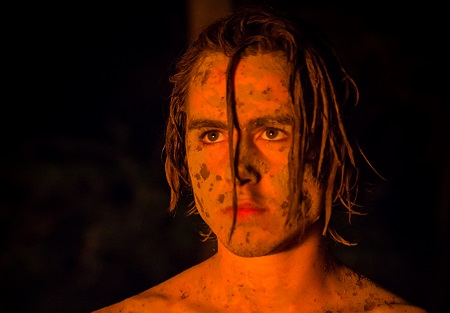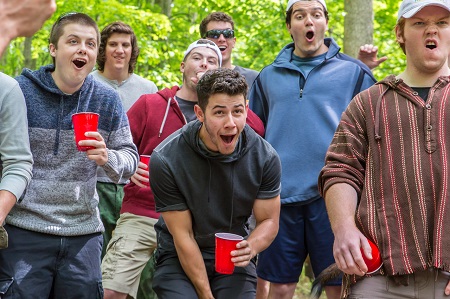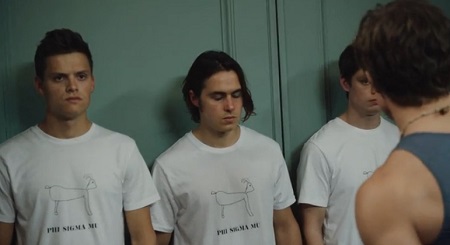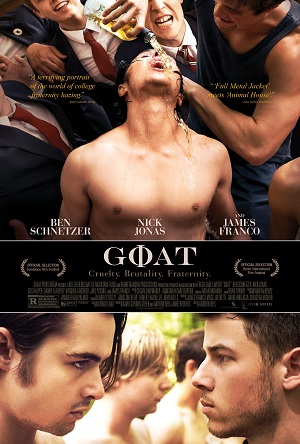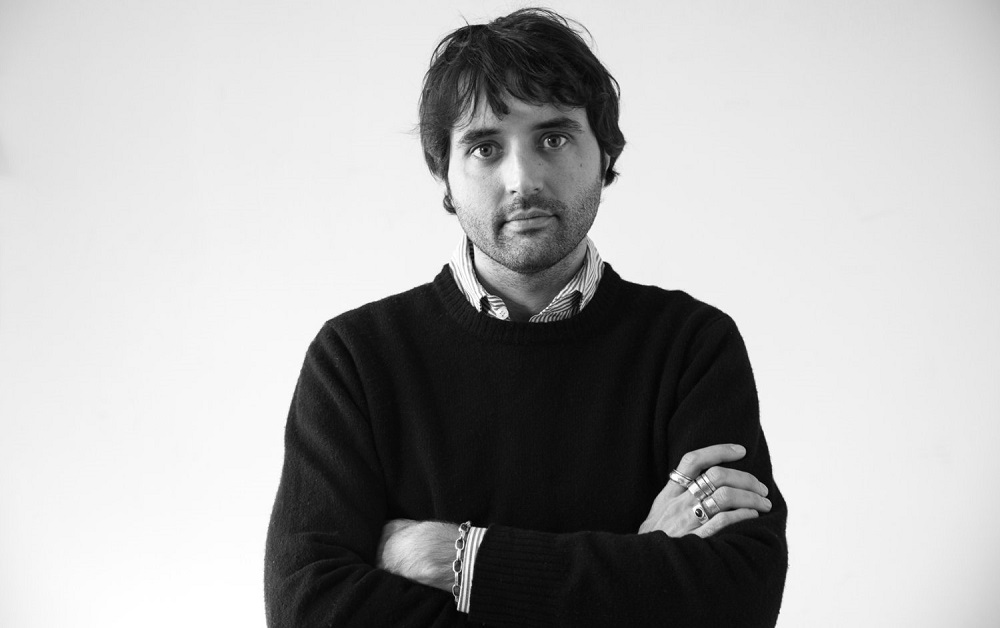
“Goat” – Interview with Andrew Neel
by Sara Michelle Fetters - September 25th, 2016 - Film Festivals Interviews
Andrew Neel on Goat, Fraternity Hazing and Making ‘Boys will be Boys’ a Thing of the Past
Director Andrew Neel‘s Goat, an adaptation of Brad Land‘s best-selling 2004 memoir, follows a young college freshman (portrayed by Snowden and Pride scene-stealer Ben Schnetzer) as he follows in his older brother Brett’s (Nick Jonas) footsteps, pledging the same fraternity. During the initiation process, he and the rest of the pledges are subjected to an inhuman series of tasks they are all expected to complete, the hazing they endure ultimately leading to tragedy and heartbreak, forcing Brad and Brett to reexamine what is happening and why they’re allowing it to.
It’s a rough film, one that doesn’t make things easy on the viewer. But it is also a story the filmmaker felt needed to be told. More, it was one he felt he was the one to tell. “The first draft of the script was written by David Gordon Green,” explains Neel. “That, along with Land’s memoir, ended up in my hands a couple of years ago and I was immediately drawn to the inherent power of the story. But there were many of layers of work that still needed to take place before we could go into production.
“I was eager to do whatever was necessary to see the film made. Lord of the Flies is one of my favorite books, the way it looks at tribalism, and a lot of my documentaries are about that as well in one way or another. I felt that subject matter was very present in Land’s memoir, and that presented a lot of exciting creative opportunities as far as a film was concerned.”
Considering the universal acclaim that met the publication of Land’s memoir in 2004, as well as a writer/director as talented and respected as Green involved with the initial composition of the script, it could be seen as slightly surprising that a movie adaptation took over a decade to see the light of day. “It was surprising,” agrees Neel. “When I first got involved in the project I almost couldn’t believe a film hadn’t been made yet. It’s such a horrifying, yet bracingly topical, investigation into this kind of stuff. Everyone knows what [hazing] is, everyone knows what it is about, and I actually felt I was pretty lucky to be one of the first ones to put this kind of story on-camera. It’s in some ways virgin territory, which was also quite surprising to me as well.”
What didn’t catch the filmmaker off-guard was the reality of fraternity hazing rituals he spent time researching before going into production and finalizing the script. “I wasn’t particularly shocked by any of the behavior I researched online and read about while doing research,” he states plainly. “I went to boarding school. I played hockey and lacrosse. I’d seen a lot of this type of behavior at close range one way or another. I think most men have, to one extent or another, seen this kind of behavior, have dealt with this kind of bullying in order to try and fit into a particular group. Sadly, I think this kind of behavior and experiences are ubiquitous for men, on some level, so none of the true stories I researched struck me by surprise.
“If anything, I think the one thing that did actually surprise me is that more hasn’t been done in regards to these situations. This sort of hazing has been going on for [decades], yet people just sort of shrug their shoulders and let it go. They let it happen. They dismiss it all as boys being boys. That’s what is surprising.”
In light of universities across the U.S. looking at hazing rituals, not just in regards to fraternities and sororities but involving their collegiate sports teams, with scandals at Baylor and Penn State so fresh in the public memory, it’s easy to wonder if the era of letting things go because boys are being boys is starting to becoming a thing of the past. Neel isn’t so certain. “I don’t know about that,” he responds. “Clearly not totally. I think the ‘boys will be boys’ mantra is still alive and well in some corners of society. These hazing rituals still happen, so that expression, boys will be boys, it’s clearly a dangerous one.
“I do think, thanks to movies like The Hunting Ground, to ESPN’s recent expose on the sexual assault cases at Baylor, it does look like people are trying to examine some of this stuff. Hopefully, that will be a good thing. I think a lot of the problems that women have on college campuses are due to problems that men are having. It’s more than just trying to teach women how to cope with a [crummy] situation, which is still pretty awful, but also holding these young men accountable for all of their actions. Boys will be boys has to become a thing of the past.
“It’s the school’s responsibility, too. They need to not be willfully ignoring this stuff. If people are continually and routinely breaking convention, breaking the law, at your institution, you should do something about it. I don’t know why you wouldn’t. It’s crazy, right? It’s common sense.”
As far as the film itself was concerned, it was important to the director to keep things as realistic as possible, even if that meant going into incredibly uncomfortable territory. “You do worry about going too far,” he admits. “But I think we all, me as the director, all of the actors, everyone working on the movie, we knew we had to push the envelope. We had to put all of this into the viewer’s face and force them to look at it.
“There were certainly times where I would call cut because it was getting too intense on the set, that people were maybe getting too carried away, and it looked like the actors portraying the pledges were running out of steam and the guys playing the brothers were starting to lose it a little bit. While it was all in service to try and make something honest, something vital, we also discovered how easy it was to get lost in how we were portraying this ourselves. It was a fine line, and it wasn’t always easy to walk.
“It’s rough, let me tell you. While making a movie like this is exciting creatively, almost like a social experiment, it’s also horrifying. You watch what you’re putting your actors through and you cringe sometimes. But I think that parallels the actual experience. I think, on some level, men do value these degrading experiences they’ve had in these sorts of situations. Maybe they’re not totally cognizant of the damage they’re doing to other people or the damage that has been done to themselves. I don’t know.”
With a story like this one, finding actors willing to throw themselves into the proceedings with fearless abandon was an absolute necessity. Finding the right person to portray Brad Land arguably even more so, and Neel understands just how lucky he was to find him in up-and-coming talent Ben Schnetzer. “When you go into the casting room, sometimes that person comes in and there’s just this spark,” he expounds. “They’re right for the part and you just know it. I mean, you have to take time to process. You have to think about it. You need to make sure your inclinations are right. But Ben nailed the audition, and he’s wonderful as Brad. I can’t imagine anyone else in the role.”
As for the look and feel of the film, the director understands his previous experience as an award-winning documentarian certainly helped, even if he doesn’t want to say he couldn’t have made Goat what it is without it. “It certainly helped,” he chuckles, “but I like to think I could have still made the movie without my documentary background. I do think my experience in these controlled environments, where you’re trying to gather material and present it as truthfully and as authentically as you can, that certainly made it easier to focus on the important parts of the story here. It also helped me feel comfortable when things looked like they were out of control. I felt like I knew what I wanted and what the best way to get there was. Hopefully, it shows in the finished film.”
– Review reprinted courtesy of the SGN in Seattle
